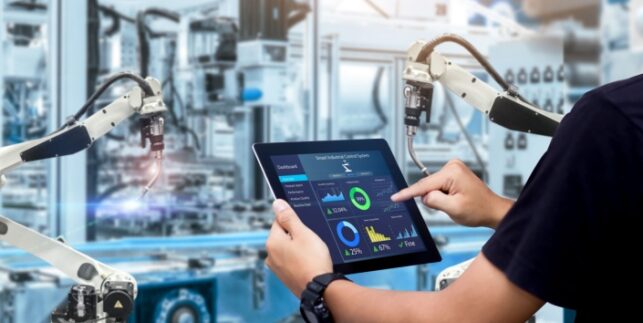How to Build a Dynamic Manufacturing Dashboard

Because of its critical role in disseminating information amongst the team, the dashboard is perhaps the most important element of shop floor control software. A dynamic dashboard allows supervisors and workers alike to track production inside a factory using shop floor control software. Set up correctly, dynamic KPI dashboards can bring order to factory production and significantly increase both output and revenue as a result.
How to Create a Dynamic Dashboard
A dynamic manufacturing dashboard must have certain attributes in order to perform as effectively as possible. A good dashboard:
- Keeps critical figures front-and-center.
While having more data never hurts, there are some data sets that are more immediately relevant than others. Since your manufacturing KPI dashboard’s purpose is to monitor changing conditions within the factory, it should place particular emphasis on information that fluctuates, such as the number of products being produced per hour or the overall quality control failure rate.
- Functions across all devices, both desktop and mobile.
Part of the appeal of shop floor control software is that it allows anyone on your team to keep an eye on production without being tethered to its physical location. It is meant to be used on the go and by many different users, all of whom will likely be using different devices to access it. A good dashboard uses responsive design to fit perfectly onto the screen of any device regardless of size, ensuring that the necessary information is always easy to read.
- Offers customizable data displays.
There is always more than one way to present information, and sometimes changing that presentation can make a big difference in comprehension. A good dynamic dashboard allows you to experiment with line graphs, bar graphs, pie charts, and other visual data formats to help you discover the display that works best for you and your team.
- Generates reports both automatically and by request.
While the dashboard itself will serve as a key touchpoint for data analysis for users on the factory floor, some occasions call for more formal presentation. A dashboard that can generate reports upon request helps your factory provide detailed evidence to prove profitability, identify weak points in production, and support any major changes you want to make.
- Requires little technical skill to operate.
It is neither realistic nor reasonable to expect every factory worker to have enough knowledge of coding to know how to configure or troubleshoot a traditional developer-focused dashboard. A dynamic manufacturing dashboard should ideally require next to no technical ability of its users. Drag-and-drop functions, pull-down menus, and other intuitive user-friendly features empower workers to master the software on their own. In doing so, they drastically speed up the data analysis process and lower labor costs at the same time.
The Power of Dynamic Dashboards
Why place so much emphasis on the dashboard? Factories stand to reap several critical benefits from having a versatile, user-friendly way to view and interact with the data provided by shop floor control software. Good manufacturing dashboards perform all of the following functions:
- They provide immediate, real-time actionable insights.
Data is most useful when it allows you to take action to correct a problem or deficiency. Dynamic dashboards keep you informed on the current state of your factory’s operations, shifting from moment to moment just as production does. This gives you the chance to observe and correct troubling trends before they can develop into exponentially more costly problems over time.
- They provide a common touchpoint for workers and management alike.
True collaboration is impossible when every staff member in a factory is being guided by different sets of data. A dynamic dashboard can focus the team around a single dataset. The information it displays will remain consistent for all viewers, ensuring that everyone working at the facility understands current floor conditions and how they can help the team progress toward overarching production goals.
- They provide flexibility and easy analysis.
No two manufacturing facilities operate identically. Each one has different standards and goals, and the combination of data points that one facility wants to track might be useless to another. Using a dynamic dashboard allows a facility to swap and rearrange the data sets that appear in this prominent location as needed. Each facility can create a dashboard that meets their unique requirements and helps them understand their production data in a context that is relevant to them.
- They store mountains of data under their simple displays.
Dynamic dashboards are used to simplify data into a form that can be easily parsed and understood. However, all of the underlying data that was fed into the display still exists inside the software and can be accessed whenever users need it. This makes it easy to investigate outlier data points, isolate data from particular time periods or areas of the factory, or pull specific bits of data as evidence for a particular argument.
- They make it easy to track progress over time.
Because the displays are standardized, using a dashboard ensures that snapshots from two different points in time will be largely identical. OEE production numbers and other noteworthy KPIs can all be compared at a glance, allowing facilities to track their production goals, organizational development, and more.

Changing the way people work in factories
Request a DemoGain Greater Visibility with Dynamic Manufacturing Software
Like any manufacturing technology, shop floor software is only as useful as it is accessible. Well-designed dynamic dashboards help to break down the complex information that the program is collecting and make it understandable and applicable for any worker on the floor.
Matics is committed to helping manufacturers achieve a greater understanding of their daily operations. Our software allows you to perform advanced manufacturing analytics and includes a powerful, responsive dynamic dashboard that everyone on your team will quickly become comfortable using. Contact us today to learn more about what our manufacturing software can do and why it is the right choice for your factory’s digital production needs.




